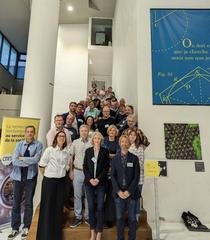URL: https://www.desy.de/news/news_search/index_eng.html
Breadcrumb Navigation
DESY News: A new European project for multimessenger astronomy in Europe
News
News from the DESY research centre
A new European project for multimessenger astronomy in Europe
In Paris in mid-September, akick-off meeting for the Astrophysics Centre for Multimessenger studies in Europe (ACME) marked the start of a new European effort in multimessenger astronomy. ACME is funded with 15 million euro from the European Union and coordinated by Centre national de la recherche scientifique (CNRS) in France and aims to realize an ambitious coordinated European-wide optimization of the accessibility and cohesion between multiple leading astroparticle and astronomy research infrastructures, offering access to instruments, data, and expertise, all focused on the new science of multi-messenger astrophysics.

ACME team members during the kick-off meeting in mid September in Paris. (Photo: Laboratoire APC, Université Paris Cité)
ACME’s objectives are to implement the Astroparticle Physics European Consortium’s (APPEC) and the Planning and Advisory Network for European Astronomy’s (ASTRONET) roadmaps’ recommendations and act as a pathfinder to broaden and improve access to the respective research infrastructures services and data, assess and evaluate new models for better coordination and provision of at-scale services, provide harmonized trans-national and virtual access, develop centres of expertise, improve science data products management, improve interoperable systems for rapid identification of astrophysical candidate events and alert distribution to optimize follow-up observations, provide training for a new and broader generation of scientists and engineers, open the astrophysics and astroparticle physics data sets to other disciplines, and increase citizen engagement.
The ACME project coordinator Prof. Antoine Kouchner (CNRS/Université Paris Cité), and co-coordinator Paolo D’Avanzo (INAF), represent each community to ensure balance and drive cross-domain collaboration. Prof. Marek Kowalski (DESY/Humboldt-University of Berlin) is co-leading the work package on realtime alerts & follow-up observations. The work in the work package will focus on building a coherent software framework that is capable of processing data from a diverse range of astronomical observatories. Furthermore, DESY will integrate data from IceCube and ULTRASAT into the ACME-system, as well as train a young generation of scientists in the use of multimessenger data.
Ultimately, the work is meant to enable a range of discoveries in multi-messenger astronomy, ranging from detecting the sources of gravitational waves all the way to the mapping of the high-energy gamma-ray and neutrino sky.



